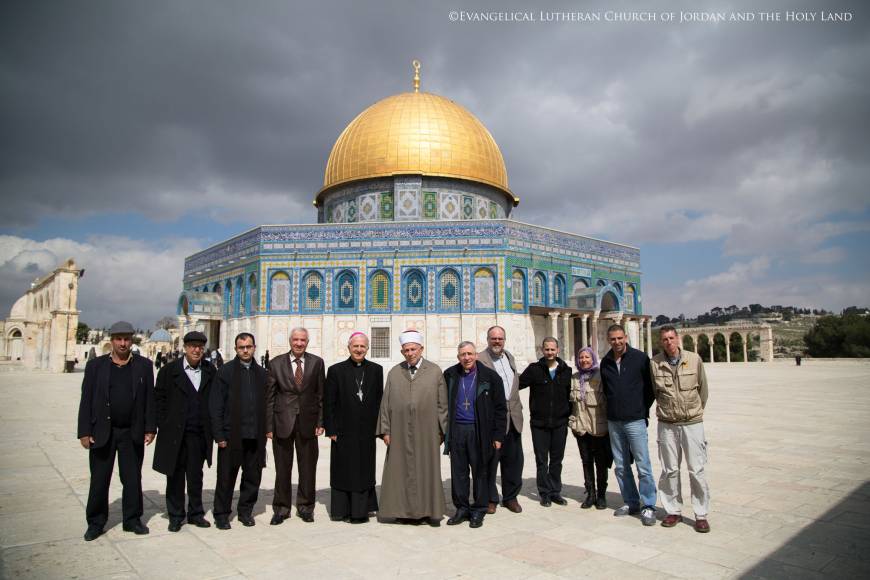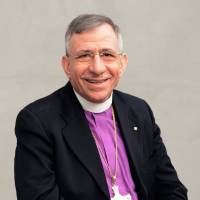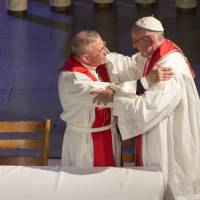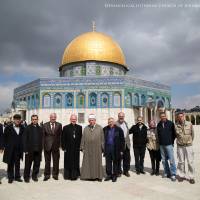The 34th Niwano Peace Prize will be awarded to Bishop Munib A. Younan of the Evangelical Lutheran Church in Jordan and the Holy Land. Younan has shown perseverance and compassion in his work to encourage dialogue between interreligious groups in the Holy Land.
In a world characterized by leaders who seek to emphasize difference and hatred, Younan has consistently strived for the opposite. His work emphasizes peace over power and unity over domination. Younan embodies the qualities that the Niwano Peace Foundation values in religious leaders, and through this award, the Niwano Peace Prize Committee wholeheartedly pays homage to his work.
The presentation ceremony will take place in Tokyo on Thursday at 10:30 a.m. In addition to an award certificate, Younan will receive a medal and prize money.
Younan was born to Palestinian refugees into a world where nation, religion and place are intimately connected with identity. The ongoing conflict between Israelis and Palestinians has been a prime example of the breakdown in communication between people whose differences appear to outweigh their similarities. The conflict between people of the three dominant religious identities has consistently been forcing Muslims, Jews and Christians further apart, to a point where violence appears to be the only mode of retaliation. Despite these complex challenges, Younan has worked with dedication to foster conversation between Jews, Christians and Muslims in Jerusalem and beyond.
Younan is former president of the Lutheran World Federation. Over his long career, he has held numerous positions in Lutheran and interfaith organizations, and has used his position to establish a wide-ranging network between religious leaders of different faiths in the Middle East. Younan was one of the fourteen religious leaders who signed the Alexandria Declaration in 2002, a document in which rabbis, sheiks and bishops pledged their commitment to establishing peace in the Holy Land, which is holy to all three faiths. His ecumenical work emphasizes commonality between religions and religious denominations, something that is integral in the struggle toward peace.
Younan is a renowned public speaker and has traveled both locally and abroad to give lectures and speeches on what makes for a just peace from a Palestinian Christian perspective based on Christian teachings and doctrine. He also has a rich list of publications that have featured his writings on peace, including his own books, “Witnessing for Peace: In Jerusalem and the World,” and “Our Shared Witness: A Voice for Justice and Reconciliation.”
His own gift for sharing valuable lessons has spread into his work toward reconciling Christian, Muslim and Jewish Israelis and Palestinians through dialogue. Younan is a strong believer in the healing power of dialogue and has worked since 1991 to create spaces where people of different faiths can meet in peace. In these important spaces, people who have been taught to hate one another are able to come together through joint reflection and dialogue with the aim to reconcile their differences. The Niwano Peace Foundation commends Younan’s tireless work to foster dialogue and interfaith healing.
Younan has been an exemplary faith leader for decades and continues to spread his light with kindness and compassion. He has shown that through the work of dialogue, which requires an opening of the self toward another, it is possible to bridge rifts of difference and slowly make the spaces between Muslims, Jews and Christians smaller. The Niwano Peace Foundation commends his tireless contribution and achievements, and it is with great pride that the 34th Peace Prize is awarded to him as the worthy and deserving recipient.
Below are some comments by members of the committee on the selection of Younan for this year’s award.
“Bishop Munib Younan has devoted his life to building peace with justice in the Middle East and globally. He continues tirelessly in a self-sacrificing manner promoting dialogue and joint action between religions and over ethnic and national divisions. He condemns strongly all kinds of religious extremism and terrorism. He is an internationally respected leader, an eloquent speaker and inspiring writer.” (Birgitta Rantakari)
“The bishop’s long-standing commitment for peace and reconciliation in the war-torn Middle East is a huge achievement to follow by other faith-based peace practitioners. He has proven that with sheer commitment to his work, others will support and join in promoting inter-religious work.” (Harsha Navaratne)
“The value of Bishop Younan’s longstanding efforts for peace in the troubled Middle East, his passionate and persistent work in promoting non-violent solutions and reconciliation, make him my candidate of choice. He is also particularly sensitive to the current refugee crisis and has called on political leaders of the world to assume responsibility.” (Judith Marie Povilus)
“(The role of being the) leading ecumenical leader in the trouble areas of the Middle East for promoting peace and justice is a remarkable one. Bishop Younan has been closely working together with Jewish, Muslim and Christian clerics to establish a council of Religious Institutions of the Holy Land since 2005.” (Jae Woong Ahn)
“For his dedication and prophetic voice. A critical voice, but one that remains hopeful, despite the challenges the Palestinian people face.” (Susan Hayward)
Background of the Niwano Peace Foundation, the peace prize and past award recipients
The Niwano Peace Foundation established the Niwano Peace Prize to honor and encourage individuals and organizations that have contributed significantly to inter-religious cooperation, thereby furthering the cause of world peace and to make their achievements as widely known as possible.
The foundation hopes in this way to enhance inter-religious understanding and cooperation and encourage the emergence of still more people devoted to working for world peace.
The prize is named in honor of the founder and first president of the lay Buddhist organization Rissho Kosei-kai, Nikkyo Niwano. For Niwano, peace was not merely an absence of conflict among nations, but a dynamic harmony in the inner lives of people, as well as in our communities, nations and the world.
Seeing peace as the goal of Buddhism, Niwano devoted much of the last half of his life to promoting world peace, especially through inter-religious discussion and cooperation.
Past Niwano Peace Prize recipients:
2016 – Centre for Peace Building and Reconciliation (CPBR)
2015 – Pastor Esther Abimiku Ibanga
2014 – Dena Merriam, founder and leader of the Global Peace Initiative of Women of U.S.A.
2013 – The Rt. Rev. Dr. Gunnar Stalsett, bishop emeritus of Oslo in the Church of Norway
2012 – Rosalina Tuyuc Velasquez, a founder of the National Coordinating Organization of Wisdoms of Guatemala (CONAVIGUA)
2011 – Sulak Sivaraksa of Thailand, a Buddhist leader of promoting social awareness about nonviolence, peace and justice
2010 – Ela Ramesh Bhatt of India, founder and former secretary general of the Self-Employed Women’s Association
2009 – Rev. Canon Gideon Baguma Byamugisha of Uganda, an Anglican priest, in recognition of his work to uphold the dignity and human rights of people with HIV/AIDS
2008 – His Royal Highness Prince El Hassan bin Talal of Jordan for tireless efforts toward building peace in the Middle East, as well as a significant role in combating prejudice and hatred worldwide
2007 – Dharma Master Cheng Yen of Taiwan, founder-leader of the Buddhist Compassion Relief Tzu Chi Foundation promoting charity medicine, education and culture since 1966
2006 – Rabbis for Human Rights of Israel, an organization of rabbis and Rabbinic students committed to promoting human rights, justice and compression for all the people of the Middle East and elsewhere around the world
2005 – Dr. Hans Kung, president of the Global Ethic Foundation in Germany and Switzerland, and an interfaith dialogue advocate
2004 – The Acholi Religious Leaders’ Peace Initiative, a northern Uganda-based peace organization with members of different religions working together
2003 – Dr. Priscilla Elworthy, head of the Oxford Research Group in Britain
2002 – The Right Rev. Samuel Ruiz Garcia of Mexico, a Roman Catholic
2001 – The Rev. Abuna Elias Chacour, a Palestinian Melchite Catholic priest in Israel
2000 – Dr. Kang Won Yong of South Korea, a Presbyterian advocate of international interfaith dialogue
1999 – The Community of Sant Egidio in Italy, a Roman Catholic lay organization involved in a wide range of peace activities
1998 – Ven. Maha Ghosananda of Cambodia, a senior Buddhist clergyman
1997 – The Corrymeela Community in Northern Ireland, promoting reconciliation between Protestants and Catholics
1996 – Marii K. Hasegawa, the former president of the U.S. branch of the Women’s International League for Peace and Freedom
1995 – Dr. M. Aram of India
1994 – Cardinal Paulo Evaristo Arns, archbishop of Sao Paulo, Brazil
1993 – Neve Shalom/Wahat al-Salam of Israel, a cooperative village advancing peaceful coexistence between Jews and Palestinians
1992 – Dr. A.T. Ariyaratne of Sri Lanka, founder and president of the Sarvodaya Shramadana rural development movement
1991 – Dr. Hildegard Goss-Mayr of Austria, honorary president of the International Fellowship of Reconciliation
1990 – Norman Cousins of the U.S., then president of the World Federalists Association
1989 – The Rev. Etai Yamada, then head priest of the Tendai Buddhist sect in Japan
1987 – The World Muslim Congress in Pakistan
1986 – Dr. Philip A. Potter of the Dominican Republic
1985 – Zhao Puchu of the People’s Republic of China
1984 – Dr. Homer A. Jack of the U.S.
1983 – Archbishop Helder Pessoa Camara of Brazil


 Click to enlarge
Click to enlarge


